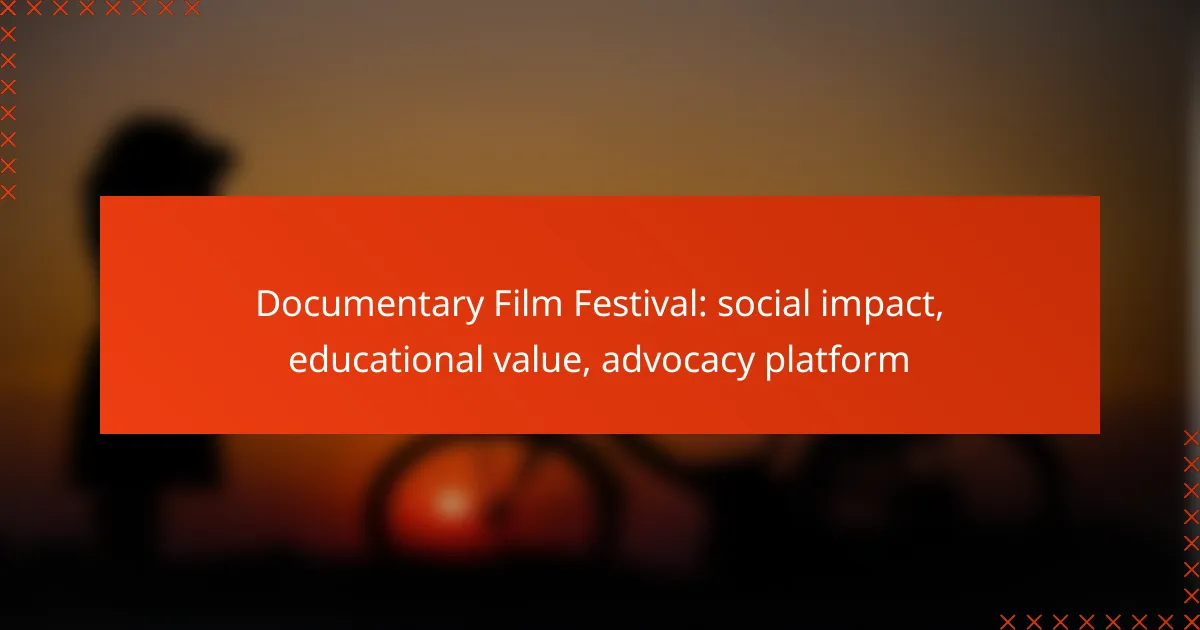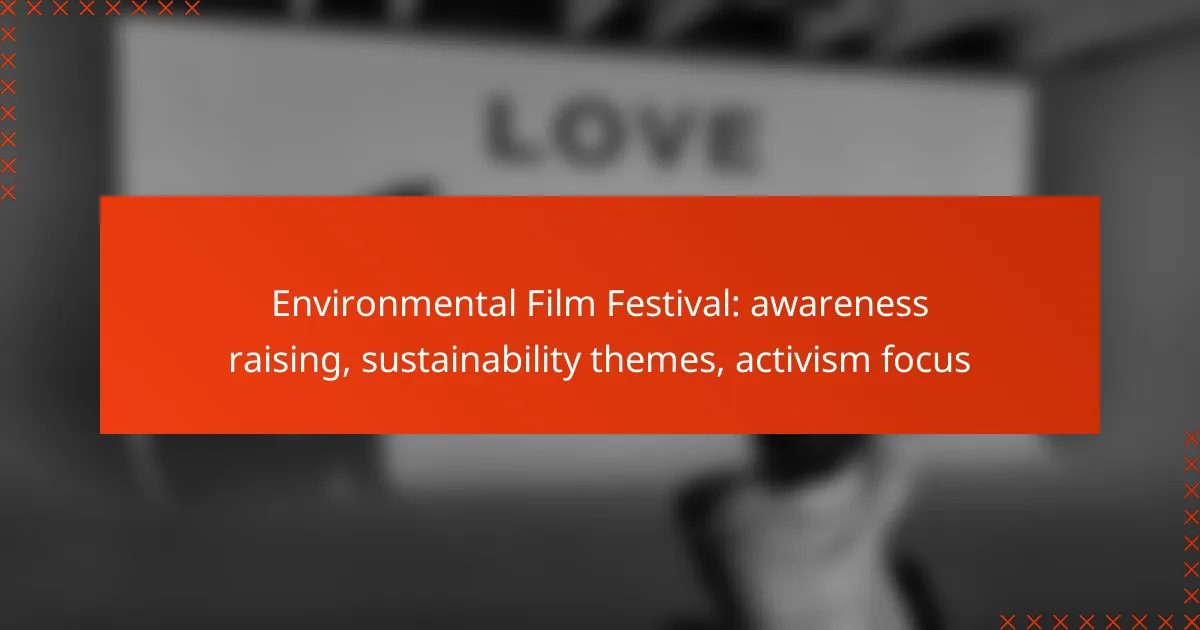Documentary film festivals are vital in promoting social change by illuminating critical issues and encouraging community dialogue. They provide educational value by enhancing critical thinking and offering diverse perspectives through compelling visual storytelling. Additionally, these festivals serve as advocacy platforms, uniting filmmakers, activists, and audiences to inspire action and foster a commitment to social justice.
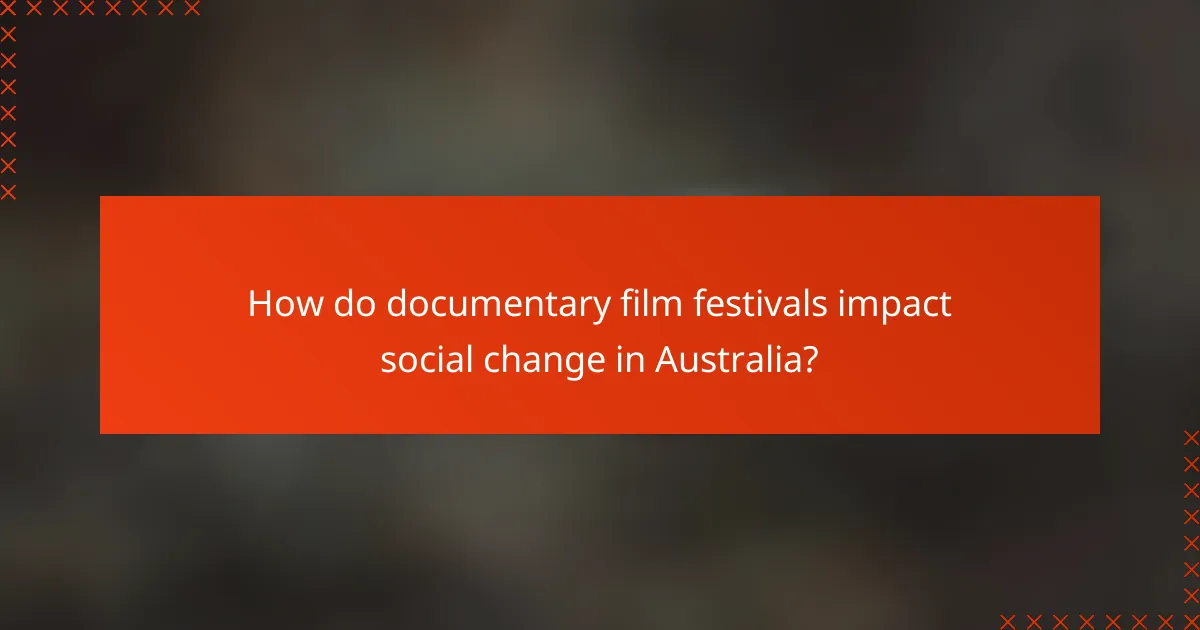
How do documentary film festivals impact social change in Australia?
Documentary film festivals in Australia play a crucial role in driving social change by highlighting pressing issues and fostering community dialogue. They serve as platforms for education, advocacy, and engagement, enabling audiences to connect with diverse perspectives and inspire action.
Increased awareness of social issues
Documentary film festivals raise awareness of various social issues by showcasing films that address topics such as climate change, inequality, and human rights. By presenting these narratives, festivals encourage viewers to confront realities they may not encounter in their daily lives.
For instance, a festival might feature a documentary on Indigenous rights, prompting discussions about historical injustices and current challenges faced by Indigenous communities in Australia. This exposure can lead to greater public understanding and support for necessary reforms.
Community engagement and activism
These festivals often facilitate community engagement by hosting panel discussions, workshops, and Q&A sessions with filmmakers and activists. This interactive format allows audiences to delve deeper into the issues presented and consider their roles in advocating for change.
Moreover, festivals can inspire local activism, as attendees may feel motivated to participate in initiatives related to the topics explored in the films. For example, a documentary about environmental conservation might lead to community clean-up events or advocacy for local policy changes.
Support for marginalized voices
Documentary film festivals provide a vital platform for marginalized voices, allowing filmmakers from underrepresented communities to share their stories. This representation is essential for fostering empathy and understanding among broader audiences.
By prioritizing films that highlight the experiences of refugees, people with disabilities, or [censured] individuals, festivals can challenge stereotypes and promote inclusivity. This support not only amplifies these voices but also encourages dialogue about systemic issues affecting these communities in Australia.

What educational benefits do documentary film festivals provide?
Documentary film festivals offer significant educational benefits by enhancing critical thinking and fostering a deeper understanding of social issues. They serve as platforms for learning, discussion, and advocacy, allowing audiences to engage with diverse perspectives through visual storytelling.
Curriculum integration for schools
Documentary film festivals can be effectively integrated into school curricula, providing students with real-world context for their studies. Teachers can use selected films to complement subjects such as history, social studies, and environmental science, encouraging students to analyze and discuss the content critically.
For instance, a documentary on climate change can be paired with lessons on environmental science, prompting students to explore the implications of the film’s message. Schools may also organize field trips to local festivals, allowing students to experience the films firsthand and participate in discussions with filmmakers.
Workshops and panel discussions
Many documentary film festivals host workshops and panel discussions that enhance the educational experience. These sessions often feature filmmakers, experts, and activists who provide insights into the filmmaking process and the social issues addressed in the films.
Participating in these discussions allows attendees to ask questions and engage directly with the creators, fostering a deeper understanding of the subject matter. Schools and community groups can benefit from organizing their own events around festival screenings, creating opportunities for dialogue and advocacy on pressing social issues.
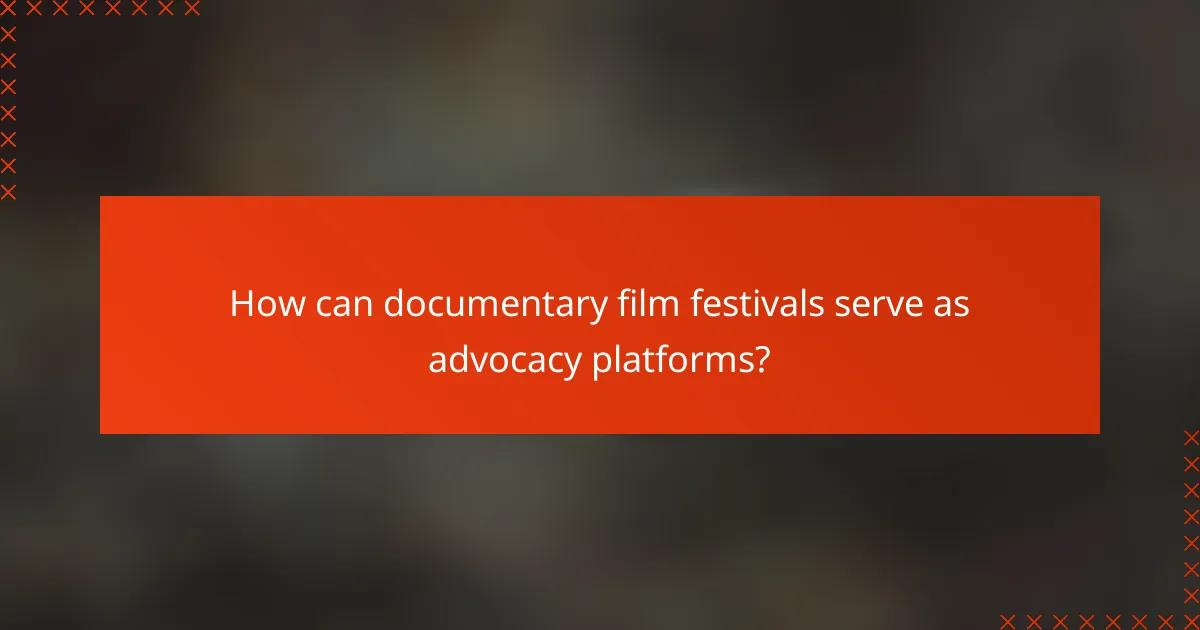
How can documentary film festivals serve as advocacy platforms?
Documentary film festivals can effectively serve as advocacy platforms by showcasing films that raise awareness about social issues and inspire action. These events create a space where filmmakers, activists, and audiences can engage in meaningful discussions, fostering a community focused on social change.
Highlighting critical social issues
Documentary film festivals often spotlight pressing social issues such as climate change, human rights, and inequality. By presenting these topics through compelling narratives, festivals can educate audiences and provoke thought, leading to increased awareness and potential advocacy.
For example, a festival might feature a documentary on water scarcity, prompting discussions about sustainable practices and local policies. This can motivate viewers to take action, whether through community initiatives or supporting relevant organizations.
Connecting filmmakers with activists
These festivals serve as a crucial link between filmmakers and activists, facilitating collaborations that amplify social messages. Filmmakers can meet activists who are directly involved in the issues portrayed in their films, creating opportunities for joint campaigns and initiatives.
Networking events and panel discussions at festivals allow for the exchange of ideas and strategies, encouraging filmmakers to refine their storytelling to better serve advocacy goals. This synergy can lead to impactful projects that resonate with audiences and drive social change.
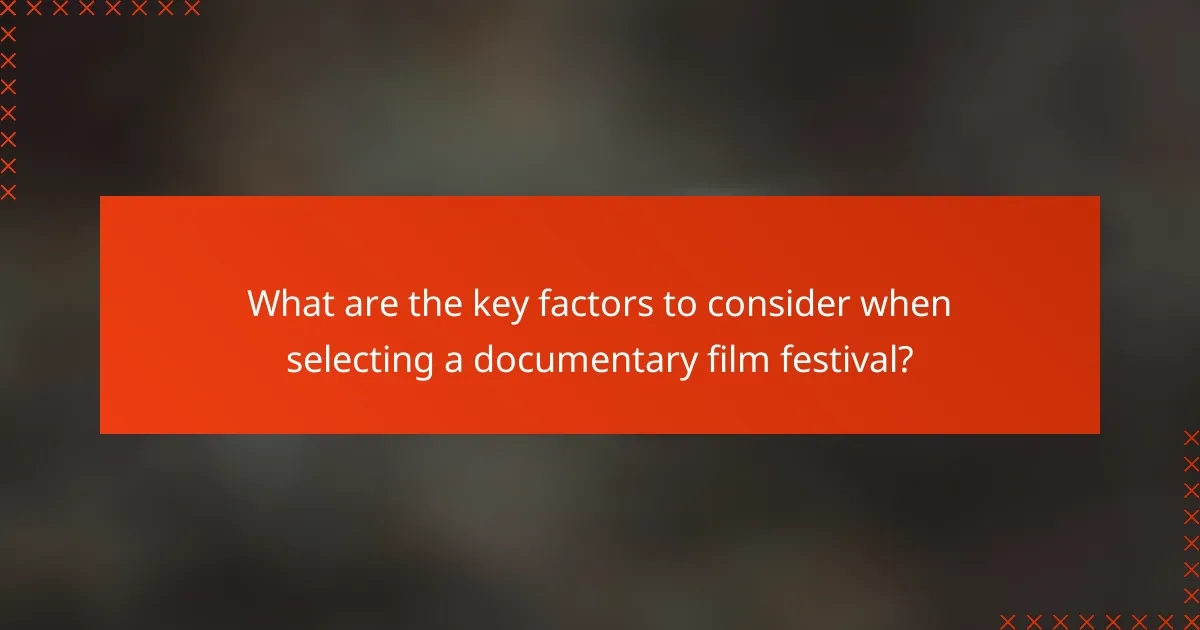
What are the key factors to consider when selecting a documentary film festival?
When selecting a documentary film festival, consider its reputation, history, and how well it aligns with your target audience. These factors can significantly influence the festival’s impact, educational value, and effectiveness as an advocacy platform.
Festival reputation and history
The reputation and history of a documentary film festival are crucial indicators of its quality and influence. Established festivals, such as Sundance or Tribeca, often attract a larger audience and more prominent filmmakers, enhancing their credibility and visibility.
Research past editions of the festival to understand its programming choices, awards, and audience engagement. A festival with a strong track record of showcasing impactful documentaries can provide better opportunities for networking and advocacy.
Target audience alignment
Aligning the festival with your target audience is essential for maximizing its social impact and educational value. Identify who the festival attracts—whether it’s industry professionals, students, or general audiences—and ensure that the themes of the documentaries resonate with them.
Consider the demographics and interests of the audience. For instance, a festival focusing on environmental issues may appeal more to eco-conscious viewers, while one centered on social justice might attract activists and educators. Tailoring your selection to fit the audience can enhance engagement and advocacy efforts.
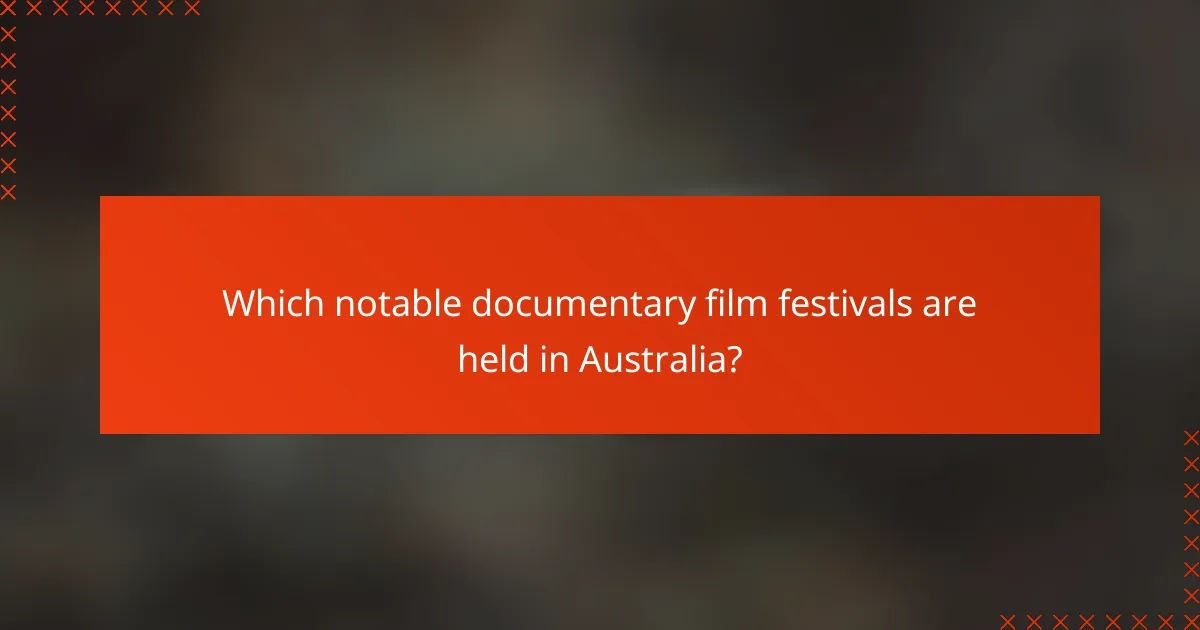
Which notable documentary film festivals are held in Australia?
Australia hosts several prominent documentary film festivals that showcase impactful storytelling and promote social issues. Notable festivals include the Sydney Film Festival and the Melbourne International Film Festival, both of which provide platforms for advocacy and education through documentary cinema.
Sydney Film Festival
The Sydney Film Festival is one of Australia’s longest-running film festivals, typically held annually in June. It features a diverse selection of documentaries that highlight social issues, cultural narratives, and innovative storytelling techniques.
Attendees can expect to see both local and international films, often accompanied by Q&A sessions with filmmakers. This engagement fosters a deeper understanding of the topics presented, making it an excellent opportunity for education and advocacy.
Melbourne International Film Festival
The Melbourne International Film Festival, usually taking place in August, is another key event that emphasizes documentary films. It showcases a wide array of documentaries that address pressing global and local issues, encouraging dialogue among audiences.
In addition to screenings, the festival often includes panel discussions and workshops, providing a rich environment for learning and advocacy. Participants can gain insights into the filmmaking process and the social contexts behind the films, enhancing the educational value of the festival.

What role do sponsors play in documentary film festivals?
Sponsors play a crucial role in documentary film festivals by providing essential funding and resources that enable the event to take place. Their support not only helps cover operational costs but also enhances the festival’s ability to promote social issues and engage audiences.
Funding for independent filmmakers
Sponsorship funding is vital for independent filmmakers participating in documentary film festivals. This financial backing can cover production costs, marketing expenses, and festival entry fees, allowing filmmakers to focus on their creative work rather than financial constraints.
Many festivals offer sponsorship packages that range from a few thousand to tens of thousands of dollars, depending on the level of exposure and benefits provided. Filmmakers should actively seek out sponsors who align with their film’s themes and values to maximize support.
Brand visibility and community support
Sponsors gain significant brand visibility through their association with documentary film festivals, which often attract diverse audiences passionate about social issues. This visibility can enhance a sponsor’s reputation and foster goodwill within the community.
By supporting documentary festivals, brands can demonstrate their commitment to social responsibility and advocacy. Engaging in community outreach initiatives or hosting panels can further strengthen their connection with festival-goers and local organizations.

How do documentary film festivals foster collaboration among filmmakers?
Documentary film festivals create an environment where filmmakers can connect, share ideas, and collaborate on projects. These festivals serve as a hub for networking, learning, and advocacy, enabling filmmakers to build relationships that can lead to future partnerships.
Networking opportunities
Documentary film festivals provide numerous networking opportunities for filmmakers, allowing them to meet industry professionals, potential collaborators, and audiences. These events often feature panels, workshops, and social gatherings designed to facilitate connections among participants.
Filmmakers can engage in discussions about their work, exchange contact information, and explore potential partnerships. For instance, a filmmaker might meet a producer interested in funding their next project or a fellow director who shares similar themes and could collaborate on a joint venture.
To maximize networking benefits, filmmakers should come prepared with business cards, a concise pitch about their work, and an open mind to explore various collaboration possibilities. Attending multiple events or participating in workshops can also enhance visibility and foster deeper connections.
